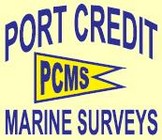 Port Credit Marine Surveys Port Credit Marine Surveys & Yacht Delivery Society of Accredited Marine Surveyors A few of the boats delivered shown below 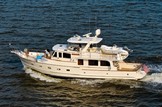 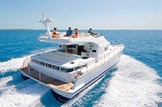 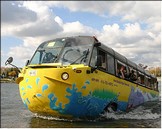 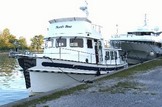 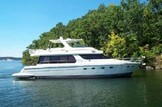 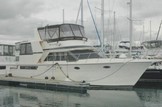
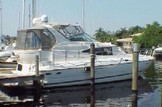 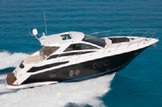 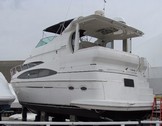 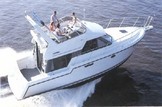
|
Getting Her Home, Yacht Delivery Services On the road again - delivery by truck or on the water ? We once had our 37', 14 ton trawler trucked from Barrie to Fergus Ontario so we could work on her over the winter in the backyard. We made the mistake of following her on the road. It was a stomach wrenching experience to watch 14 tons of boat jumping 6" in the air at 70mph. Although overhead wires in Ontario are regulated at a minimum height of 18', my 15' high boat tore down telephone and electrical cables many times in that short journey. Damage was fortunately minimal but our preparations for the return journey was much more thorough. It may be worthwhile having pre and post shipment surveys depending on how much money is involved. Given the rigors of loading, unloading, lifting on travel lifts and over the road transport, proving damage occurred on route may be difficult. If you prefer not to hire a surveyor for this, at least take dozens of time/date stamped photos at loading. You or your representative must be present when the boat arrives to take more photos. If you show up three days after she has been dropped off and find damage ..... well the finger pointing between trucker and yards begins and without proof, you loose. Check out the transporter as thoroughly as you checked out your surveyor, there are more than a few horror stories out there. Ask the yard if they are familiar with the trucker and how good they are about properly securing the vessel on the truck, expertise and reliability. Check with your insurer to see if they know of any claims against the trucker. Much damage can be done if the trailer pads are placed between bulkheads which is not uncommon. Get several references and preferably on the same type of boat. At 70mph loose objects on or in the boat can become projectiles, so secure everything, leave nothing loose. A gallon container of oil, the electrolyte from unsecured batteries or even a jar of pickles can do tremendous damage. The less gear on the boat, the better. While it may not be practical to empty fuel tanks you should certainly empty waste and water tanks prior to transport as the free surface effect of several hundred pounds of fluid can be devasting. The trucker expects to pick up a boat that is properly prepared for the journey. He is not going inside the vessel to check, that is your responsibility. He is not going to dismantle the dodger/bimini or enclosure and secure all the frame work, that is your responsibility as are loose lines on deck and anchors in bow rollers. Imagine a 35lb. anchor swinging loose at 70mph ! If the vessel is being trucked from warm weather to cold, she must first be winterized. You can hardly blame the trucker if she arrives from Florida to Ontario in February with a cracked block due to freezing. Water in the bilge when she leaves Georgia may not be a problem but when it freezes in Ontario it may very well be. Even if not going to cold weather, draining the exhaust system is a very good idea as sudden braking or acceleration could push water in the mufflers up into the cylinders. Request a copy of the truckers insurance
and email it to your insurer for his opinion
on whether the trucker has the proper endorsements
and
insurance limits. Get a written contract.
if the truck shows up with a name different
than the company you hired you better
find
out why before you let him load the
boat.
Make sure that the truck that shows
up looks
in as good condition as the one on
their
website. |
|||
| I have had a few bad experiences dealing
with violently ill people throwing up all
over the boat and others who insisted on
playing with the radar while crossing busy
shipping lanes in heavy rain and 12' seas.
I had one gentleman who wanted to pilot his
boat into his home marina and after getting
it into a very dangerous (irretrievable)
position in a cross wind, walked away from
the wheel saying "You take it".
I travel with my own crew, my partner in life and trusted best friend, Sharon, whom I know can be trusted in all conditions to do what is required. If an engine goes down I need to know that while I'm working on it, there is someone trustworthy at the helm. Sharon and I are quite comfortable handling 55' through locks but on longer trips or longer boats, we may wish to have additional crew and those too will be trusted and experienced friends whom I know can be counted on. Sharon and I will comfortably run vessels of up to 55' (like a Fleming 55)' between Antigua and Lake Superior for vessels larger than this we have a short list of trusted additional crew. There are some areas that we will not run overnight due to traffic and navigational issues. |
 The team - Sharon and Wallace |
|||
| The experience of your candidates will show
in the questions they ask before accepting
the job. They will want a letter from your
insurer proving coverage. They will want
copies of the bill of sale, registration
or license and a customs clearance number
for cross border deliveries or some method
of insuring taxes/duties are paid at the
border if applicable. They will want a copy
of the most recent survey and detailed information
as to recent work on the boat, current condition
and preparations made for the trip. Any skipper worth his salt will also want
basic spares and applicable tools onboard
i.e. oil, oil filters, fuel filters and impellers.
I also request that the boat be fueled when
I arrive as I will be departing at sun-up.
You do not want to pay me to hang around
for half a day before the summer help shows
up to open the fuel dock and then another
couple of hours for them to find the keys
to the fuel pump. Even licensed captains do not carry insurance for this kind of work so you should get an approval letter from your insurer for the hired captain to be covered under your policy. Quite often the insurer will OK your choice even if unlicensed if they are satisfied with their experience. On larger dollar vessels, the insurance company might insist on a licensed captain. Either way written confirmation to the captain must be provided. Upon arrival we will take a number of photographs of the vessel as we try very hard to deliver it in exactly the same condition as we picked it up. We insist on some time to crawl around the boat to familiarize ourselves with locations of seacocks, inspect battery installation, mechanical systems and to inspect fuel filters. What we need from You Most qualified delivery skippers will charge a daily rate plus all expenses from door to door (their door that is), My door is Toronto, Ontario. We will provide an estimated time for the trip and require pre-payment on that estimate and initial travel (flights, etc.) costs. We will not deliver a vessel on trips of more than 3 days without autopilot. You will have to provide your captain a method (cash or credit card) of paying for fuel, dockage, food, canal transit passes etc. On certain trips we will require radar. Cooking, potable water systems and head must be functional. All electrical systems must be safe and functional. All required safety gear must be functional and in good condition.i.e. bilge pumps, life jackets, fire extinguishers. All navigation gear including appropriate charts,running lights, VHF, GPS, Sound signalling and compass must be functional. Upon our arrival at the vessel the first few hours will be spent on familiarization. You must ensure your insurance company of who is taking command and get their approval. This has never been an issue as most insurers already have us on file if not,simply send them the link to our "Credentials" page. Lastly any alcohol must be removed from the vessel before we take command. We will provided you with a daily log and a final accounting after delivery. Please visit OUR FEE SCHEDULE page should you wish to pursue an on water delivery with us. PS. We only deliver powerboats as I've yet to find a sailor who would pay our daily rate :) 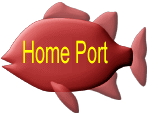 |
||||